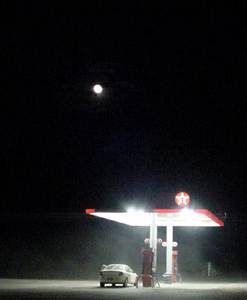Adventures in Journalism, Part Two:
The Gas Pump and the Damage Done

SteelerFan Dan sent along this Chicago Tribune story, to me, presumably to distract me as we prepare for our upcoming fantasy football draft. Incidentally, I am guaranteed to get LT, LJ, or Shaun Alexander. Considering I got stuck with the evil number six pick last year – a pick that left me with the choice of a bunch of guys who eventually underwhelmed American en masse – and figured Corey Dillon was no worse than the rest of the lot. Needless to say, I wasn't the one disappointed by Mr. Dillon's output last season. Yet, it's fair to say that the number three pick has me giddy about the prospects of this season.
Despite the jinx guaranteed to me by all of this in print, as I said – Giddy.
 Anyway, the four-part story, entitled "Oil Safari: A Tank of Gas, A World of Trouble," is one reporter's attempt to show exactly how buying each gallon of gas translates into contributions to the War in Iraq, warlords in countries like Nigeria, and terrorists throughout the Middle East.
Anyway, the four-part story, entitled "Oil Safari: A Tank of Gas, A World of Trouble," is one reporter's attempt to show exactly how buying each gallon of gas translates into contributions to the War in Iraq, warlords in countries like Nigeria, and terrorists throughout the Middle East.He does it thanks to the open-door extended to him by the Marathon gas station company, which permitted him to track a single fill-up of gas from a Chicagoland gas station, to a particular refinery outside Chicago, to a particular oil tanker, which the reporter traced to Nigeria. As he notes:
For a span of five months, from September through February, other fuel shipments to the station were analyzed for their crude composition. Molecules swirled through the South Elgin Marathon's gas pumps from Nigeria, Iraq and Venezuela, as well as from declining oil fields in the United States.Wow.
Taken together, they revealed the immense human costs, the boggling technical investments, the hardball politics, the hidden exploitation and, ultimately, the alarming fragility of America's epic oil addiction--as seen through the prism of a local gas station. U.S. consumers and faraway producers were finally tethered, without resorting to metaphor or guesswork, by a clear oil trail.
Thus, $73.81 worth of unleaded pumped one Saturday afternoon by a Little League mom was traced not simply back to Africa, but to a particular set of offshore fields in Nigeria through which Ibibio villagers canoed home to children dying of curable diseases.
Every day, the jaded tanker drivers brought human stories echoing in their trucks. They plunked their long wooden measuring sticks into the Marathon station's 40,000-gallon underground tanks, and the resulting subterranean gong evoked—depending on the changing oil vintage—an Iraqi ex-colonel's cavernous loneliness. Or the laments of a West African fisherman named Sunday, afloat on a fishless stretch of the Atlantic. Or the songs of Marxist Indians reveling in their newfound oil wealth atop a dusty South American plateau.
The voices of Chinese oil prospectors gurgled inside all of the fuel shipments. And diluted in the gas came a warning that many Americans seem unprepared to hear: Our nation's energy-intensive joy ride, powered by 150 years of cheap petroleum, may finally be coming to an end. This could be as good as it gets.
The guy went undercover as a gas station clerk for months, and then went to Nigeria to see firsthand how the oil makes it from the ground to the ships.

The story is crafted so that the stories of those who channel the oil from subterranean Nigeria into the ships are poetically juxtaposed against those who sell and buy gasoline in suburban Chicago.
It's journalism the way it's meant to be practiced. And that excerpt is merely from part one. This excerpt from Part Two is sublime:
In South Elgin, Michelle Vargo was Scotch-taping notices to the Marathon's convenience store countertops: "FREE CANDY BAR IF CASHIER DOES NOT SUGGEST A PRODUCT OR SERVICE."
Post-Katrina gas theft had eased when prices ebbed to $2.85 a gallon – the apparent pain threshold of American motoring. But the convenience store sales had slumped. Since they represent 80 percent of the station's profits, the owner, Prairie State Enterprises, was leaning hard on the staff – and especially on Vargo – to vend.
The gas station store's 550-item inventory exceeds the shopping choices of even the biggest supermarkets in Port Harcourt, Nigeria.
But that didn't help Vargo. What do jaded American drivers want? What do they need?
She offers them 88 varieties of cigarettes, 111 types of cool drinks, eight flavors of Tums antacid tablets, three choices of mini-pizzas warming under heat lamps, banana nut cappuccino, AC/DC ball caps, ultra-ribbed condoms, 7-inch locking pliers, and the Denzel Washington version of "The Manchurian Candidate" on DVD. For the spiritually inclined she stocks "Cheech & Chong's" incense and two kinds of Native American dream catchers – meant to ward off bad spirits – made in China and tagged at $9.99 each.
"I'm gonna walk away if the pressure keeps up," Vargo said. "I'd hate to do it. I was here during construction. I feel like this station is mine. But I can't take it forever."
Her cell phone rang. She took the call outside. She paced the pumps, her free arm gesturing wildly under the pearly winter sky. She was ignored by the limo drivers in their dead men's suits. By the grumpy and overworked truckers. And by a man who arrived every day to break a $20 bill with an M&Ms purchase so he could play the Lotto machines.
The station's key commodity – refined petroleum – was as invisible as ever. The only evidence that it even existed was a faint tang of gasoline.

See? Granted, it's a long-arsed story, but no worse than your typical lead story in The New Yorker, Atlantic Monthly, or Harpers. It certainly requires a commitment.
My point? Make the commitment.
2 Comments:
nice posts; like reading 'em. gimme a call about a papa hike tomorrow; look me up in the phone book if you don't have the numbah =)
7:45 PM
I'm finding your lobster "updates" to be vastly entertaining. Especially when you use the term "pontificate," seemingly without irony.
Funny stuff, friend.
Oh, I also read the Secret Life of Lobsters, which was spectacularly nuanced. There's something to be said for books that get their start as articles (I'd read it actually, it came out eons ago, and was in something kind of Harpersesque. Or maybe it was Outside. If it matters.) Anyway, there's much to love about those who write from bona fide experience, rather than those wacky pontificators.
Whoever and wherever they are.
12:01 PM
Post a Comment
<< Home